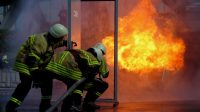Four Factors for Recycling Hazardous Waste Secondary Materials Without Shame—I mean Sham
New Definition of ‘Sham Recycling’ Sham recycling refers to claims by a hazardous waste generator that the waste is being recycled when it is in fact being discarded. A new definition at 40 CFR 261.2(g) codifies EPA’s concept of sham recycling: “A hazardous secondary material found to be sham recycled is considered discarded and a […]










